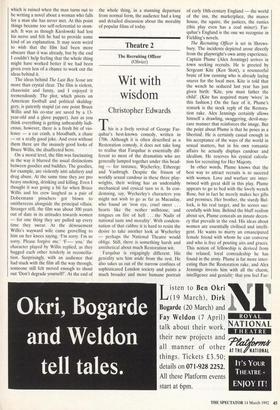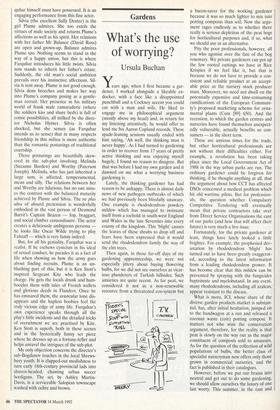Theatre 2
The Recruiting Officer (Olivier) Wit with This is a lively revival of George Far- quhar's best-known comedy, written in 1706. Although it is often described as a Restoration comedy, it does not take long to realise that Farquhar is essentially dif- ferent to most of the dramatists who are generally lumped together under this head- ing — for instance, Wycherley, Etherege and Vanbrugh. Despite the frisson of worldly sexual candour in these three play- wrights, their writing has an undeniably mechanical and cynical turn to it. In con- demning, say, Wycherley's characters you might not wish to go as far as Macaulay, who found an 'iron eye, cruel sneer . . . hearts like the nether millstone, and tongues on fire of hell .. . the Nadir of national taste and morality'. With condem- nation of that calibre it is hard to resist the desire to take another look at Wycherley — perhaps the National Theatre would oblige. Still, there is something harsh and antithetical about much Restoration wit.
Farquhar is engagingly different. His geniality sets him aside from the rest. He also takes us out of the narrow confines of sophisticated London society and paints a much broader and more humane portrait of early 18th-century England — the world of the inn, the marketplace, the manor house, the squire, the justices, the rustics (this play even has a coal miner). Far- quhar's England is the one we recognise in Fielding's novels.
The Recruiting Officer is set in Shrews- bury. The incidents' depicted arose directly from the playwright's own army experience. Captain Plume (Alex Jennings) arrives in town seeking recruits. He is greeted by Sergeant Kite (Ken Stott), a resourceful brute of low cunning who is already laying snares for the local men. Kite is told that the wench he seduced last year has just given birth: 'Kite, you must father the child'. (Kite has acquired many 'wives' in this fashion.) On the face of it, Plume's remark is the stock reply of the Restora- tion rake. Alex Jennings certainly allows himself a drawling, swaggering, devil-may- care manner that reinforces the image. But the point about Plume is that he poses as a libertine. He is certainly casual enough in his acceptance of the ways of the world in sexual matters, but in his own romantic affairs he actually displays candour and idealism. He reserves his cynical calcula- tion for recruiting for Her Majesty.
In other words, Plume knows that the best way to attract recruits is to succeed with women. Love and warfare are inter- twined with great skill in this play. Plume appears to go to bed with the lovely wench Rose, but in fact he merely makes her gifts and promises. Her brother, the sturdy Bul- lock, is his real target, and he scores suc- cessfully with him. Behind the bluff realism about sex, Plume conceals an innate decen- cy that prevails in the end. His ideas about women are essentially civilised and intelli- gent. He wants to marry an emancipated female friend with whom he can converse and who is free of pouting airs and graces. This notion of fellowship is derived from the relaxed, loyal comradeship he has found in the army. Plume is far more inter- esting than the Restoration rake, and Alex Jennings invests him with all the charm, intelligence and geniality that you feel Far- quhar himself must have possessed. It is an engaging performance from this fine actor.
Silvia (the excellent Sally Dexter) is the girl Plume admires. She too extols the virtues of male society and returns Plume's affections as well as his spirit. Her relations with her father Mr Balance (David Ross) are open and grown-up. Balance admires Plume too. Nothing seems to stand in the way of a happy union, but this is where Farquhar introduces his little twists. Silvia now stands to inherit her father's estate. Suddenly, the old man's social ambition prevails over his instinctive affections. Sil- via is sent away. Plume is not good enough. Silvia dons breeches and makes her way into Plume's company posing as a gentle- man recruit. Her presence in his military world of frank male camaraderie (where the soldiers kiss and share beds) is full of comic possibilities, all milked by the direc- tor Nicholas Hytner. Silvia is often shocked, but she senses (as Farquhar intends us to sense) that in many respects friendship in this milieu is more authentic than the romantic posturings of traditional courtship.
Those posturings are beautifully skew- ered in the sub-plot involving Melinda (Suzanne Burden) and Worthy (Paterson Joseph). Melinda, who has just inherited a large sum, is affected, temperamental, mean and silly. The relations between her and Worthy are hilarious, but no one miss- es the contrast with the balanced maturity achieved by Plume and Silvia. The ne plus ultra of absurd pretension is wonderfully embodied in the vast person of Desmond Barrit's Captain Brazen — fop, braggart, and social climber extraordinaire. The actor creates a deliciously ambiguous persona he looks like Oscar Wilde trying to play Falstaff — which is very funny indeed.
But, for all his geniality, Farquhar was a realist. If he eschews cynicism in his ideal of sexual conduct, he parades it as a fact of life when showing us how the army goes about finding recruits. Plume is an un- blushing part of this, but it is Ken Stott's inspired Sergeant Kite who leads the charge. He gets the locals drunk and bam- boozles them with tales of French wallets and glorious deeds in Flanders. Once he has ensnared them, the avuncular tone dis- appears and the hapless boobies feel the truly vicious edge of army life. Farquhar's own experience speaks through all the play's little incidents and the detailed tricks of recruitment we see practised by Kite. Ken Stott is superb, both in these scenes and in the hysterically funny set piece where he dresses up as a fortune-teller and helps unravel the intrigues of the sub-plot.
My only objection concerns the director's sub-Bogdanov touches in the local Shrews- bury youth. It is clapped-out modishness to turn early 18th-century provincial lads into shaven-headed, chanting urban soccer hooligans. The set, by Ashley Martin- Davis, is a serviceable Salopian townscape washed with ochre and brown.



























































 Previous page
Previous page